Results 1 to 2 of 2
Thread Information
Users Browsing this Thread
There are currently 1 users browsing this thread. (0 members and 1 guests)
-
03-17-2013, 06:15 PM #1
In immigration fight, farm visas provide an opening
In immigration fight, farm visas provide an opening
Steps in the long road to hiring foreign workers
Farmers and ranchers who cannot find U.S. workers can use the agricultural guest worker program, H2A, to bring in temporary foreign workers. The process is long and laborious. A look at the steps each farmer must complete to get a H2A visa for a foreign worker:
- 1 75 days before
- 2 45 days before
- 3 30 days before
- 4 30 days before
Source: Sources: U.S Department of Labor; U.S. Citizenship and Immigration Services
Alan Gomez, Jeff Dionise, Tory Hargro, Joan Murphy and Karl Gelles, USA TODAY
Alan Gomez, USA TODAY5:20p.m. EDT March 17, 2013
Farmers need more workers to harvest crops but say H2A visas that could help them are tangled in red tape. This issue could be a springboard for comprehensive immigration change.
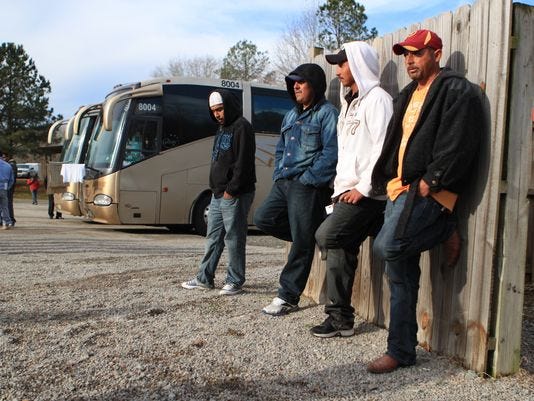
From left to right, Alejandro Juarez Garcia, Noe Javier Belancourt Ortiz, Arnulfo Tinoco T., Jose Angel Rosas E., wait in the parking after having their visas processed.(Photo: Katie Sweeney for USA TODAY)
Story Highlights
- H2A visas let non-U.S. citizens work on farms, ranches and vineyards
- Farmers say red tape and high costs keep them from seeking these legal workers
- If the farm-visa controversy can be settled, a larger immigration bill might have a chance
CLINTON, N.C. There was a time when Tracy Pope didn't have to worry about finding enough people to harvest the bell peppers, tobacco, squash and zucchini springing forth from his 500 acres of farmland.
Pope, a fourth-generation farmer, used to rely on family, neighbors, teens and a few hired hands to turn out for picking season. But locals increasingly find better work for the same pay outside the fields, so Pope does what many farmers do in America he hires foreigners.
Unlike many farmers, he does it legally by going through a federal program that gives temporary work permits, known as H2A visas, to non-U.S. citizens to work on farms, ranches and vineyards across the country.
Yet the process is so bureaucratic that Pope, who uses his computer for little more than checking the weather, pays a firm specializing in the visas to handle the immense amount of paperwork and the considerable investment in time required to get them.
"I would eventually do something wrong, whether I knew it or not," Pope said of his attempts to comply with the regulatory process.
As the White House and Congress try to settle on the first major overhaul of immigration laws in a quarter-century, a point of simple agreement would appear to be that the nation's crop producers need a legal and reliable pool of workers. Otherwise, produce will be left rotting in the fields. This is the one piece of the immigration puzzle that affects all Americans, as the stability and affordability of the food supply is at stake.
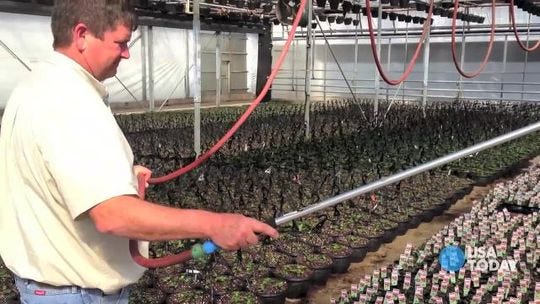
Members of Congress keenly aware of this problem say that if they can't reach agreement on farm visas, there will be little hope for any meaningful legislation on immigration.
Bipartisan groups in both chambers of Congress have been trying to finalize their bills by this week before leaving Washington for a two-week break. Although they've reached agreement on many aspects of the immigration overhaul including enhancements to border security, a pathway to citizenship for the nation's 11 million illegal immigrants and enforcement of immigration law the farm visa controversy festers.
"It's absolutely crucial," said Rep. Mario Diaz-Balart, R-Fla., one of the lead House negotiators on immigration. "It's something that a lot of members expect to be part of any immigration bill. Without that, we potentially lose votes."
U.S. companies employ more than 1 million people to do the field work necessary to maintain the nation's food supply and make the United States an international food exporter. Half of those workers are illegal immigrants, according to the Department of Agriculture. Even though there are no limits to the number of H2A visas that can be granted each year, only 65,000 were issued last year.
One reason farmers avoid the program is that they prefer illegal immigrants who can be paid less and have no rights to complain, according to migrant worker advocates in Mexico. Others simply refuse to deal with the complexity of the system. Farmers must spend two-and-a-half months and hundreds of dollars getting approval from several state agencies and four federal agencies just to get one H2A worker on their land.
"It's really complicated," Pope said with a laugh, boasting that he doesn't even own a smart phone.
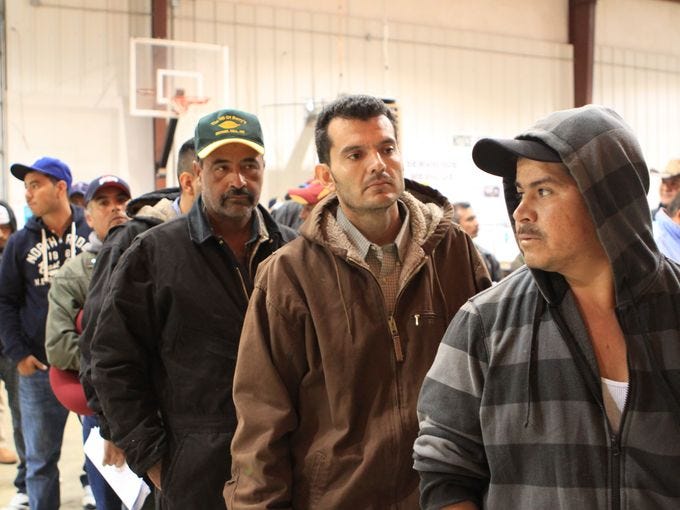 The North Carolina Growers Association processes hundreds of guest-worker visas for farmers around the state in Vass, N.C. Katie Sweeney for USA TODAY
The North Carolina Growers Association processes hundreds of guest-worker visas for farmers around the state in Vass, N.C. Katie Sweeney for USA TODAY
Related storyFullscreen
 Busloads of guest workers arrive early in the morning to get their visas processed, receive their first payment check and get bused to the farms at which they will be working. Katie Sweeney for USA TODAY
Busloads of guest workers arrive early in the morning to get their visas processed, receive their first payment check and get bused to the farms at which they will be working. Katie Sweeney for USA TODAY
Related storyFullscreen
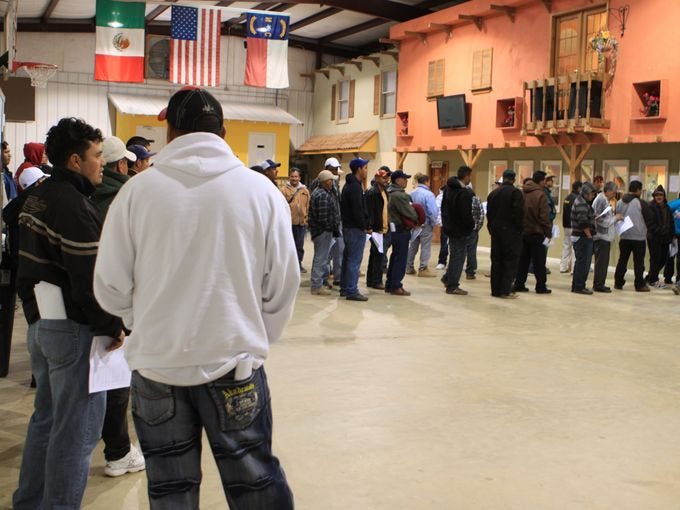 The North Carolina Growers Association is a non-profit cooperative that provides labor via the H2A program or guest-worker program in a joint-employer format. Katie Sweeney for USA TODAY
The North Carolina Growers Association is a non-profit cooperative that provides labor via the H2A program or guest-worker program in a joint-employer format. Katie Sweeney for USA TODAY
Related storyFullscreen
 Roberto Mesia Garcia, 51, from Mexico, gets his passport and visa checked by Oscar Orellana at the North Carolina Growers Association in Vass, N.C., on Feb. 14. Katie Sweeney for USA TODAY
Roberto Mesia Garcia, 51, from Mexico, gets his passport and visa checked by Oscar Orellana at the North Carolina Growers Association in Vass, N.C., on Feb. 14. Katie Sweeney for USA TODAY
Related storyFullscreen
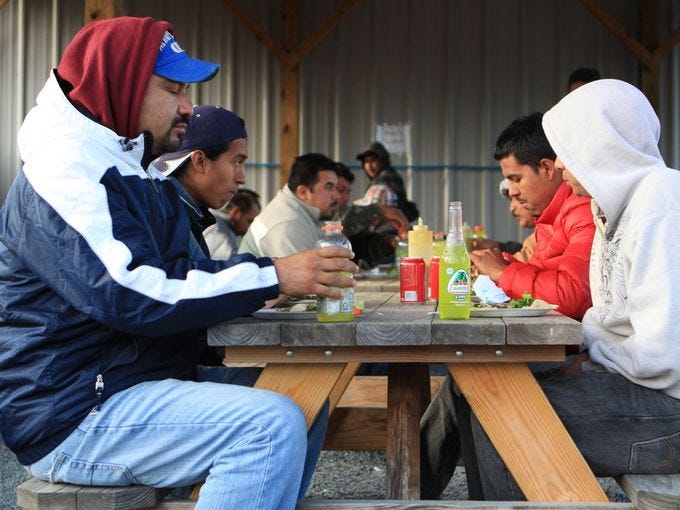 Guest workers take a break after having their visas processed. Many farmers in the U.S. hire foreign workers to help plant and harvest their crops; not all of them do it legally. Katie Sweeney for USA TODAY
Guest workers take a break after having their visas processed. Many farmers in the U.S. hire foreign workers to help plant and harvest their crops; not all of them do it legally. Katie Sweeney for USA TODAY
Related storyFullscreen
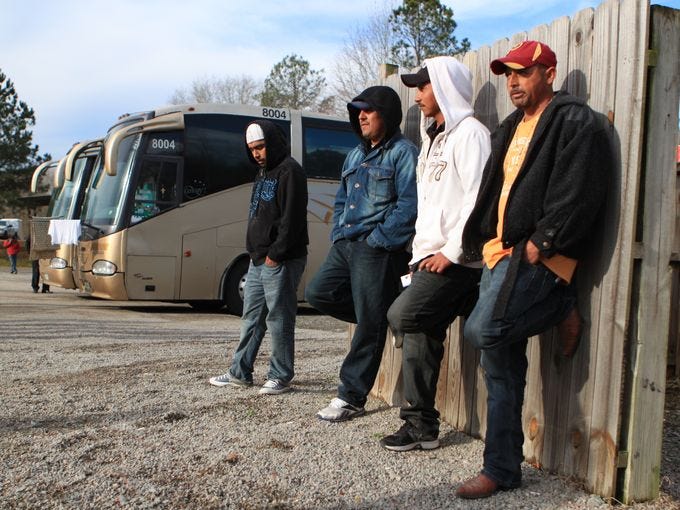 Some farm workers wait in the parking lot after having their visas processed. U.S. companies employ more than 1 million people to do the field work required to maintain the nations food supply. Half of those workers are illegal immigrants, according to the U.S. Department of Agriculture. Even though there are no limits on H2A visas, only 65,000 were issued last year. Katie Sweeney for USA TODAY
Some farm workers wait in the parking lot after having their visas processed. U.S. companies employ more than 1 million people to do the field work required to maintain the nations food supply. Half of those workers are illegal immigrants, according to the U.S. Department of Agriculture. Even though there are no limits on H2A visas, only 65,000 were issued last year. Katie Sweeney for USA TODAY
Related storyFullscreen
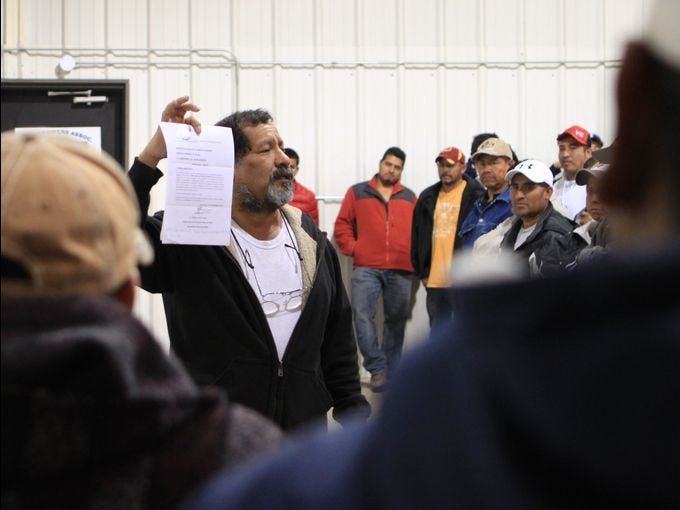 Assistant field supervisor Santos Orellana gives guest workers a briefing before he distributes their first checks. Migrant-worker advocates say that one reason farmers avoid the legal visa program is that they prefer illegal immigrants who can be paid less and have no avenues to complain. Katie Sweeney for USA TODAY
Assistant field supervisor Santos Orellana gives guest workers a briefing before he distributes their first checks. Migrant-worker advocates say that one reason farmers avoid the legal visa program is that they prefer illegal immigrants who can be paid less and have no avenues to complain. Katie Sweeney for USA TODAY
Related storyFullscreen
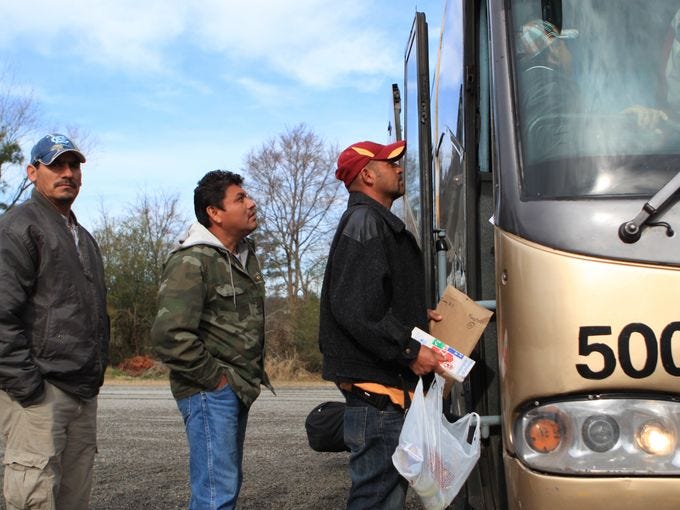 After the visas are processed, workers are bused to their farms in North Carolina. Many farmers simply refuse to deal with the complexity of the system. Farmers must spend two-and-a-half months and hundreds of dollars getting approval from several state agencies and four federal agencies in order to get one H2A worker on their land. Katie Sweeney for USA TODAY
After the visas are processed, workers are bused to their farms in North Carolina. Many farmers simply refuse to deal with the complexity of the system. Farmers must spend two-and-a-half months and hundreds of dollars getting approval from several state agencies and four federal agencies in order to get one H2A worker on their land. Katie Sweeney for USA TODAY
Related storyFullscreen
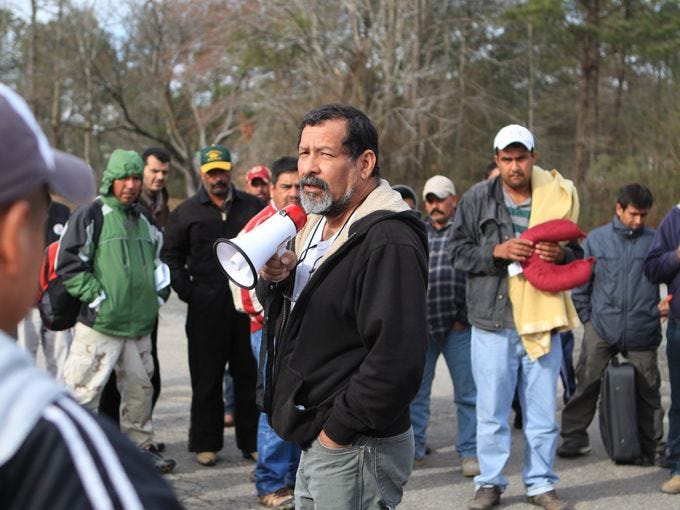 Santos Orellana, an assistant field supervisor, addresses guest workers in Vass, N.C. One of the things standing in the way of a more liberal worker visa system is that many Americans and labor unions say the U.S. should not welcome foreign workers when millions of citizens are out of work. Katie Sweeney for USA TODAY
Santos Orellana, an assistant field supervisor, addresses guest workers in Vass, N.C. One of the things standing in the way of a more liberal worker visa system is that many Americans and labor unions say the U.S. should not welcome foreign workers when millions of citizens are out of work. Katie Sweeney for USA TODAY
Related storyFullscreen
 Jesϊs Rivera Villami plants bell pepper seeds in a greenhouse on the Pope & Son farm in Clinton, N.C. The farm works with the North Carolina Growers Association and the H2A program to receive farm labor. Katie Sweeney for USA TODAY
Jesϊs Rivera Villami plants bell pepper seeds in a greenhouse on the Pope & Son farm in Clinton, N.C. The farm works with the North Carolina Growers Association and the H2A program to receive farm labor. Katie Sweeney for USA TODAY
Related storyFullscreen
 Eight to ten workers are housed in this unit.The farm labor shortage is a myth its just an unwillingness to pay a fair wage, says Bob Dane of the Federation for American Immigration Reform, a group that seeks lower levels of legal and illegal immigration. Katie Sweeney for USA TODAY
Eight to ten workers are housed in this unit.The farm labor shortage is a myth its just an unwillingness to pay a fair wage, says Bob Dane of the Federation for American Immigration Reform, a group that seeks lower levels of legal and illegal immigration. Katie Sweeney for USA TODAY
Related storyFullscreen
 This is one of the bunks for guest workers atPope & Son.There was a time when Tracy Pope didnt have to worry about finding enough people to harvest the bell peppers, tobacco, squash and zucchini springing forth from his 500 acres of farmland. Katie Sweeney for USA TODAY
This is one of the bunks for guest workers atPope & Son.There was a time when Tracy Pope didnt have to worry about finding enough people to harvest the bell peppers, tobacco, squash and zucchini springing forth from his 500 acres of farmland. Katie Sweeney for USA TODAY
Related storyFullscreen
 Obed Romero Antonio, from Mexico, plants bell pepper seeds in a greenhouse at Pope & Son in Clinton, N.C. Katie Sweeney for USA TODAY
Obed Romero Antonio, from Mexico, plants bell pepper seeds in a greenhouse at Pope & Son in Clinton, N.C. Katie Sweeney for USA TODAY
Related storyFullscreen
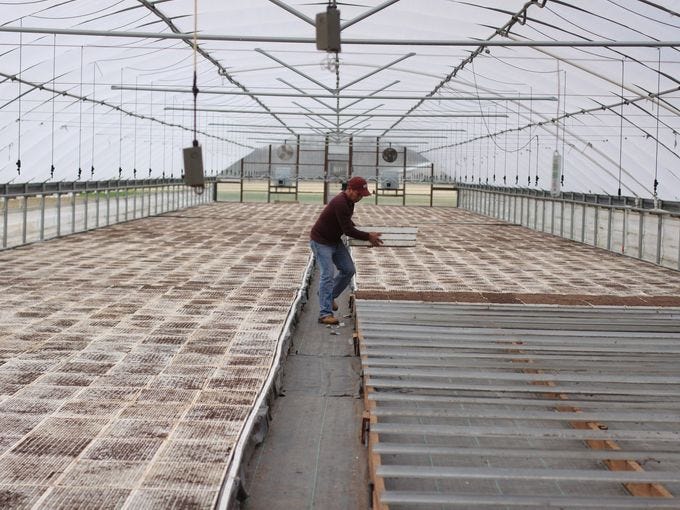 Obed Romero Antonio, from Mexico, plants bell pepper seeds in a greenhouse at Pope & Sons in Clinton, N.C. As the White House and Congress try to settle on the first major overhaul of immigration laws in a quarter-century, a point of simple agreement would appear to be that the nation's crop producers need a legal and reliable pool of workers. Otherwise, produce will be left rotting in the fields and the stability and affordability of the food supply is at stake. Katie Sweeney for USA TODAY
Obed Romero Antonio, from Mexico, plants bell pepper seeds in a greenhouse at Pope & Sons in Clinton, N.C. As the White House and Congress try to settle on the first major overhaul of immigration laws in a quarter-century, a point of simple agreement would appear to be that the nation's crop producers need a legal and reliable pool of workers. Otherwise, produce will be left rotting in the fields and the stability and affordability of the food supply is at stake. Katie Sweeney for USA TODAY
Foreign workers don't like the program either. It tethers them to the company that won the approval to hire them. If the workers feel they're being mistreated by the boss, they can't go down the road to find another job.
"You have to live with your eyes open and your mouth shut," said Blas Burboa, 27, a Mexican man who dropped out of the program after two years and is bouncing between jobs in Mexico.
The farm labor shortage is a myth it's just an unwillingness to pay a fair wage
Bob Dane, Federation for American Immigration ReformAlso standing in the way of changes: Many Americans and labor unions say the United States should not welcome foreign workers when millions of citizens are out of work as the nation's unemployment rate hovers around 8%.
"The farm labor shortage is a myth it's just an unwillingness to pay a fair wage," said Bob Dane of the Federation for American Immigration Reform, a group that advocates for lower levels of legal and illegal immigration.
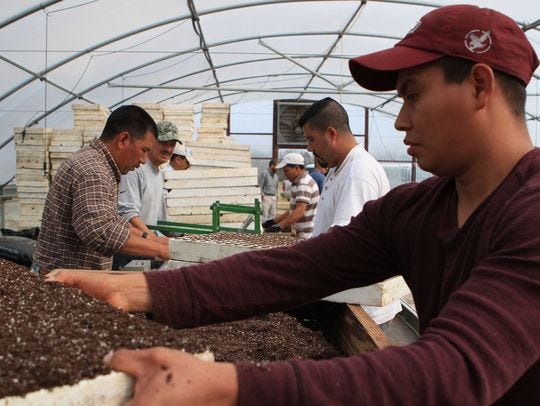 Obed Romero Antonio, from Mexico, plants bell pepper seeds in a greenhouse at Pope & Son in Clinton, N.C.(Photo: Katie Sweeney for USA TODAY)
Obed Romero Antonio, from Mexico, plants bell pepper seeds in a greenhouse at Pope & Son in Clinton, N.C.(Photo: Katie Sweeney for USA TODAY)
DIFFICULTY FOR FARMERS
In 2011, Dale Foreman lost more than $1 million because he couldn't find enough people to pick apples in his Washington state apple orchard. As he prepared for the 2012 harvest, Foreman convinced his son an MIT-educated Army veteran to return from his job in Seattle to help find workers around his orchards in the rural, central part of the state.
"Every night, he started going to churches, campgrounds, motels, bars," Foreman said. "He'd pull up and jump out of his pickup truck and introduce himself. He spent all spring and summer getting us organized."
Farmers, ranchers and growers across the country tell similar tales.
In Vermont, dairy farmers have had difficulty finding workers legal, illegal, American or not. Daniel Baker, an assistant professor at the University of Vermont's Department of Community Development and Applied Economics who has studied the dairy industry, said farmers have had to get creative, even recruiting mothers with kids in school to help milk their cows.
"Take your kid to school, do the early-afternoon milking and then be home by the time school is out," Baker said.
Still, few take part in the H2A program, seen as too expensive and too cumbersome.
A farmer applying for an H2A visa for a foreign worker must start the application process 2.5 months before the worker is needed. To win approval, the farmer must pay several fees and file separate applications to, and win approval from, several state agencies, the U.S. Department of Labor and U.S. Citizenship and Immigration Services. The farmer must then arrange for the worker to get an interview with the State Department at a consulate in the worker's home country and get the OK from Customs and Border Protection for the worker to cross the border.
That process is further complicated by delays in the paper-based system, which just started going online four months ago. A September report by the U.S. Government Accountability Office found that 63% of applications sent to Labor were returned with requests for changes or additional documentation.
Farmers say that uncertainty often leaves them scrambling for workers during the all-important harvest season.
"In an industry where you're dealing with perishable crops, where just a few days delay could cause tremendous economic damage, that is nerve-wracking," said Mike Gempler, executive director of the Washington Growers League. "Everybody who's been involved in this has scraped their nails to the nub and turned a lot of gray hairs waiting until the last minute to see if you're going to get people here on time."
It's difficult to predict months in advance when workers will be needed.
Bert Lemkes, co-owner of Van Wingerden International greenhouses in Mills River, N.C., said he needs up to 350 workers to prepare the flowers and potted plants his business ships to Walmart and Target stores throughout the region. He shudders to think what would've happened to those contracts last year when winter broke two weeks early.
Lemkes said the government should screen potential guest workers, allow them into the country and let them find work themselves.
"We would like to see a visa system that we can get people in here that are legal, we can ask 'Where's your visa?' and if they have that, we can put them to work," Lemkes said.
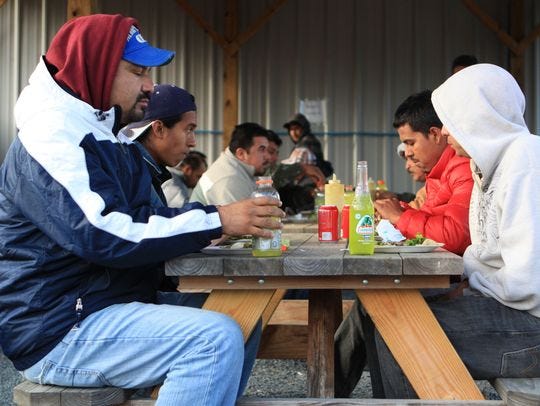 Guest workers take a break after having their visas processed. Many farmers in the U.S. hire foreign workers to help plant and harvest their crops; not all of them do it legally.(Photo: Katie Sweeney for USA TODAY)
Guest workers take a break after having their visas processed. Many farmers in the U.S. hire foreign workers to help plant and harvest their crops; not all of them do it legally.(Photo: Katie Sweeney for USA TODAY)
DIFFICULTY FOR WORKERS
The road isn't an easy one for the foreign workers, either. And it starts long before they step foot on U.S. soil.
Allegations of recruiting irregularities have been rampant in Mexico, the main provider of H2A workers. Many pay recruiters for the right to secure the coveted visas illegal under both U.S. and Mexican law and take out large loans to pay them, according to a survey released last month by the Centro de los Derechos del Migrante (CDM).
Ten percent said they paid fees for jobs that never materialized. Fifty-eight percent said they paid fees that averaged $590 to recruiters, and 47% took out loans, often to the recruiters themselves at interest rates sometimes topping 70%.
"That's the option workers see: I will pay this guy to get me a job in the U.S.," said Jessica Stender, CDM legal affairs director in Mexico City.
Even if they find a good employer, guest workers say, it's a hard, lonely life.
Pedro Becerra, 27, has worked at a Christmas tree nursery in Flintwood, N.C., since 2007. He has been able to save up enough money to buy a new house, a new TV and a refrigerator for his wife and 3-year-old son back in Mexico. But he said the nine months he must spend away from home each year has been brutal.
"You lose a lot being here," Becerra said. "But I'm here so my son doesn't have to fight as hard as I do. Everyone is trying to make a better life for their kids, right?"
Becerra said he has been treated well by his employers. For those working for other kinds of bosses, the options are few.
Blas Burboa was studying to be a lawyer in Morelia, Mexico, when he ran short of money to finish school. He heard the glowing tales from friends legal passage into the USA, an air-conditioned bus to cross the border instead of the brutal march through deserts and mountains, and salaries 10 times higher than he could find in Mexico.
What he encountered was something else entirely.
"They treated us like animals," he said.
Burboa took a job at a tomato operation in Arkansas run by Candy Brand. Burboa said he suffered daily verbal abuse from the work chief. He said laborers were not allowed to leave the farm and worked from sunrise to sunset every single day, "except July Fourth."
I was scared they would kick me out if I said anything bad.
Blas Burboa, foreign workerWhat frustrated him the most was the fact that none of the workers was paid overtime the main reason so many of them came over. He was afraid to tell anyone because he knew that would earn him a ticket back to Mexico.
"You're in a foreign country; you're working for a foreign company," he said. "I was scared they would kick me out if I said anything bad."
Burboa eventually joined a class-action lawsuit against Candy Brand. The company and its officers agreed to a settlement with about 1,900 workers in Dec. 2011 and paid them $1.9 million for unpaid overtime and other expenses. The Southern Poverty Law Center, which represented the workers in the lawsuit, said such victories are rare.
In a report titled "Close to Slavery," SPLC's legal director, Mary Bauer, said Burboa's reluctance to plead for better treatment is a common theme among workers. Employers decide which workers come to the USA and when they should be sent back, which Bauer said leaves workers at the mercy of their bosses.
"Because of this arrangement, the balance of power between employer and worker is skewed so disproportionately in favor of the employer that, for all practical purposes, the worker's rights are nullified," Bauer wrote. "At any moment, the employer can fire the worker, call the government and declare the worker to be 'illegal.'"
Immigration advocates are pushing Congress to grant "portability" to workers allowing them to move from one employer to another if they are being mistreated or paid too little. Even some agribusiness owners support such a proposal.
"It's totally American. It's competitive," Lemkes said. "If I take care of my employees here, they don't want to go work for my neighbor. If my neighbor treats them better, they should go work for him."
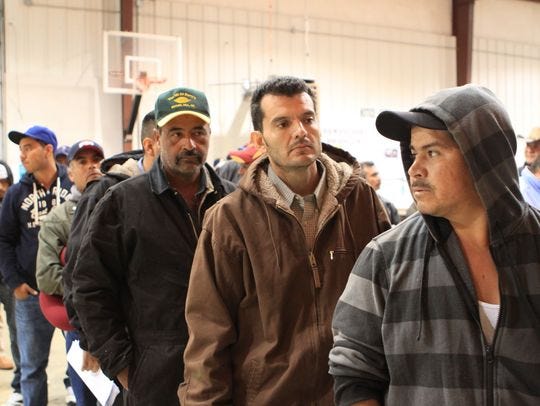 The North Carolina Growers Association processes hundreds of guest-worker visas for farmers around the state in Vass, N.C.(Photo: Katie Sweeney for USA TODAY)
The North Carolina Growers Association processes hundreds of guest-worker visas for farmers around the state in Vass, N.C.(Photo: Katie Sweeney for USA TODAY)
AMERICAN JOBS
Bill Carrothers grew up on a farm in Arkansas, spent years in the border state of Arizona and now lives in Monterrey, Calif., surrounded by some of the most fertile land in the country. And, of course, that means he's surrounded by foreign workers legal and illegal.
From his perspective there, Carrothers, 70, wonders why so little focus in the immigration debate has been on American workers.
"American jobs for American workers, and Mexican jobs for Mexican workers," said Carrothers, a retired high school science teacher. "What is so wrong with that? What is so heretical about this thought?"
He and others say many business owners in the USA, especially in agribusiness, have cried wolf about the state of their industry so they can rely on illegal immigrants for cheaper labor.
That argument is supported by a 2011 report from the Federation for American Immigration Reform. According to the report, agriculture companies reported an average 77% increase in their corporate earnings from 1998-2008, faring far better than companies in mining, manufacturing, utilities and construction.
Eric Ruark, the report's author, said that though family farmers are indeed struggling, large-scale commercial farms which account for 84% of agricultural output would fare just fine paying higher wages.
"If you're a large operator, there's a good chance you're raking in the bucks," he said.
Ruark said agribusiness has made the work so difficult and the pay so low that Americans go for jobs that pay as much or more and are far less difficult. What's needed, he said, is a system that better prohibits illegal immigrants from getting employment.
Only then, Carrothers said, could the proper balance finally be struck, and foreign workers will no longer be needed.
"I love you guys, but you need to go home and straighten out your own country," he said, referring to foreign farmworkers. "To Mexico, with love."
http://www.usatoday.com/story/news/nation/2013/03/17/immigration-guest-workers/1946699/NO AMNESTY
Don't reward the criminal actions of millions of illegal aliens by giving them citizenship.
Sign in and post comments here.
Please support our fight against illegal immigration by joining ALIPAC's email alerts here https://eepurl.com/cktGTn
-
03-17-2013, 06:46 PM #2
don't you come & tell me that I know a guy who live In PIttston Pa has apply for a job crown Display
& the guy told this other guy you can apply but don't think you will,get the job this company Is fill
with Illegal Immigrants ,. so don't say USA don't want to pick That all BS Our american Guy & girl work
LIke hell pay the right salary * you will,.see ship them all,.back home Im still out of work


 LinkBack URL
LinkBack URL About LinkBacks
About LinkBacks








 Reply With Quote
Reply With Quote


Illegal Alien Charged with Sexually Assaulting Two Girls After...
04-23-2024, 05:10 PM in illegal immigration News Stories & Reports